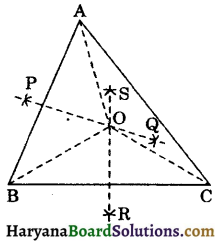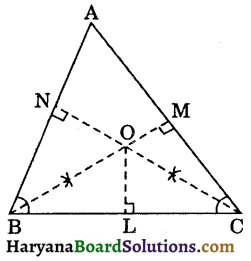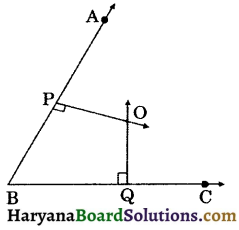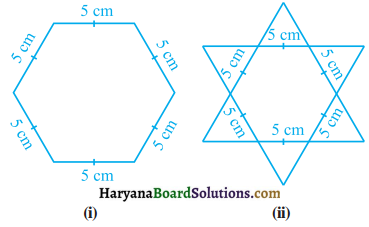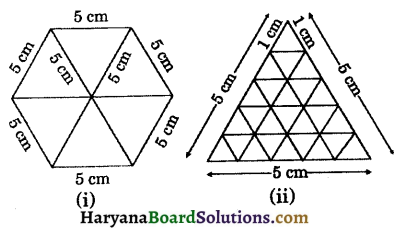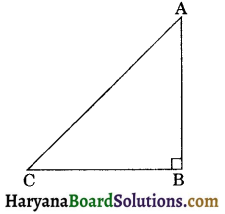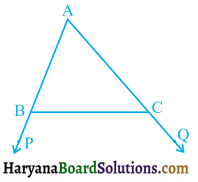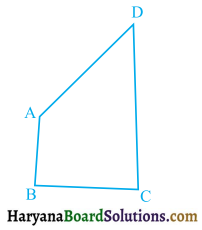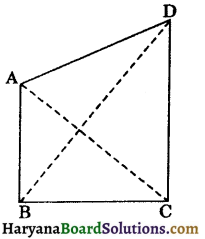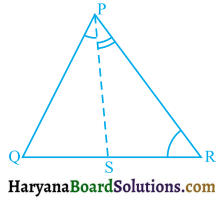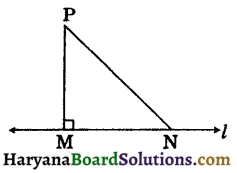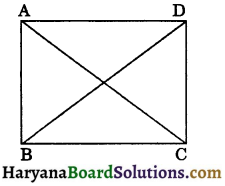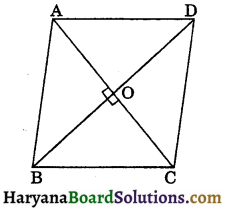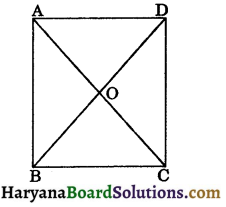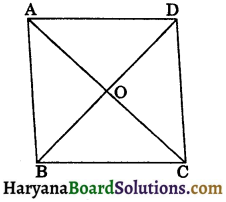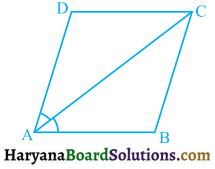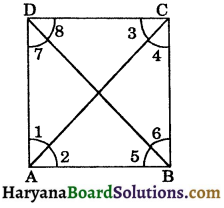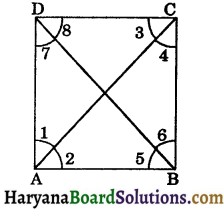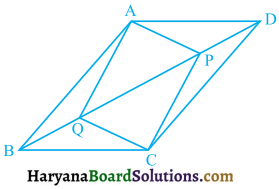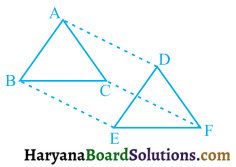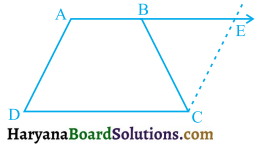Haryana State Board HBSE 9th Class English Solutions Beehive Chapter 1 The Fun They Had Textbook Exercise Questions and Answers.
Haryana Board 9th Class English Solutions Beehive Chapter 1 The Fun They Had
HBSE 9th Class English The Fun They Had Textbook Questions and Answers
Thinking about the text
Activity :
Calculate how many years and months ahead from now Maije’s diary entry is:
(गणना कीजिए कि अब से कितने वर्ष बाद मार्गी ने अपनी डायरी में यह विवरण दर्ज किया है)
Answer:
About 141 years and 3 months ahead.
(लगभग 141 वर्ष तथा 3 माह बाद।)
I. Answer these questions in a few words or a couple of sentences each.
The Fun They Had Question Answer HBSE 9th Class Question 1.
How old are Margie and Tommy?
(मार्गी और टॉमी की आयु कितनी है?)
Answer:
Margie is eleven and Tommy is thirteen years old.
(मार्गी ग्यारह और टॉमी तेरह वर्ष का है।)
The Fun They Had Meaning In Hindi HBSE 9th Class Question 2.
What did Margie write in her diary?
(मार्गी ने अपनी डायरी में क्या लिखा?)
Answer:
Margie wrote in her diary, “Today Tommy found a real book!”
(मार्गी ने अपनी डायरी में लिखा, “आज टॉमी को एक वास्तविक पुस्तक मिली!”)

Beehive Chapter 1 HBSE 9th Class Question 3.
Had Margie ever seen a book before?
(क्या पहले कभी मार्गी ने पुस्तक देखी थी?)
Answer:
No, Margie had never seen a book before.
(नहीं, मार्गी ने पहले कभी कोई पुस्तक नहीं देखी थी।)
The Fun They Had Important Questions HBSE 9th Class Question 4.
What things about the book did she find strange?
(पुस्तक के बारे में उसे कौन-सी बातें विचित्र ली?)
Answer:
She found that the words in the book stand still. They did not move like the words on the television screen. It had the same words on it that they had read earlier.
(उसने पाया कि पुस्तक में शब्द एक ही स्थान पर स्थिर हैं। वे टेलीविजन के पर्दे पर शब्दों की तरह हिल नहीं रहे थे। पुस्तक में अभी भी वे शब्द वहीं पर थे जो उन्होंने पहले पढ़ लिए थे।)
Class 9th Beehive Chapter 1 Question Answer HBSE Question 5.
What do you think a telebook is?
(आप दूरदर्शन पुस्तक के बारे में क्या समझते हैं?)
Answer:
It is not like a real book that is printed on pages. It is a book that is telecast on the T.V. screen.
(यह एक असली पुस्तक की तरह नहीं थी जो कि पन्नों पर छपी होती थी। यह एक ऐसी पुस्तक है जिसका प्रसारण टेलीविजन के पर्दे पर किया जाता है।)
The Fun They Had Chapter Question Answer HBSE 9th Class Question 6.
Where was Margie’s school? Did she have any classmates?
(मार्गी का स्कूल कहाँ पर था? क्या उसका कोई सहपाठी भी था?)
Ans.
Margie’s school was in her house. Her schoolroom was in the room next to her bedroom. She had no classmate.
(मार्गी का स्कूल उसके घर में था। उसका स्कूल कक्ष उसके शयनकक्ष से अगले कमरे में स्थित था। उसका कोई सहपाठी नहीं था।)

Class 9 Beehive Chapter 1 HBSE Question 7.
What subjects did Margie and Tommy learn?
(मार्गी और टॉमी कौन-से विषयों का अध्ययन करते थे?)
Answer:
Margie learnt geography and mathematics while Tommy learnt history subject.
(मार्गी भूगोल और गणित तथा टॉमी इतिहास विषय का अध्ययन करते थे।)
II. Answer the following with reference to the story.
Questions And Answers Of The Fun They Had HBSE 9th Class Question 1.
‘I wouldn’t throw it away.’
(‘मैं इसे फेंकूगा नहीं।’)
(i) Who says these words?
(ये शब्द कौन कहता है?)
Answer:
Tommy says these words.
(ये शब्द टॉमी कहता है।)
(ii) What does ‘It’ refer to?
(“It’ शब्द किसके लिए प्रयोग किया गया है?)
Answer:
‘It’ refers to the old book that was printed on paper.
(it’ शब्द उस प्राचीन पुस्तक के लिए प्रयोग किया गया है जो कागज पर छपी हुई थी।)
(iii) What is it being compared with by the speaker?
(वक्ता के द्वारा इसकी किस चीज से तुलना की गई है?)
Answer:
The speaker compares it with his television screen.
(वक्ता इसकी तुलना अपने टेलीविजन की स्क्रीन से करता है।)

2. Sure they had a teacher, but it wasn’t a regular teacher. It was a man.”
(‘अवश्य ही उनके पास एक शिक्षक होता था, लेकिन वह एक स्थाई शिक्षक नहीं होता था। वह एक इंसान था।’)
(i) Who does they refer to?
(‘They’ शब्द किसके लिए प्रयोग किया गया है?)
Answer:
The word ‘they’refers to the students of the time when there were real books and man teachers in the schools.
(‘They’ शब्द उस समय के विद्यार्थियों के लिए प्रयोग किया गया है जब स्कूलों में वास्तविक पुस्तकें और मनुष्य अध्यापक हुआ करते थे।
(ii) What is it contrasted with?
(i) What does fregular’ mean here?
(यहाँ पर ‘नियमित’ का क्या अर्थ है?)
Answer:
Here ‘regular’ means a mechanical teacher that appeared on the T.V. screen daily.
(यहाँ पर ‘नियमित’ का अर्थ एक तकनीकी अध्यापक से है जो प्रतिदिन टेलीविजन की स्क्रीन पर उपस्थित होता था।)
(i) What is it contrasted with?
(इसकी किस बात के साथ तुलना की गई है?)
Answer:
It is contrasted with a human teacher who taught in the schools of the old days.
(इसकी एक मानव अध्यापक के साथ तुलना की गई है जो पुराने जमाने के स्कूलों में पढ़ाया करता था।)

III. Answer each of these questions in a short paragraph (in about 30 words).
The Fun They Had Questions Answers HBSE 9th Class Question 1.
What kind of teachers did Margie and Tommy have?
(मार्गी और टॉमी के किस प्रकार के शिक्षक वे?)
Answer:
Margie and Tommy had mechanical teachers. They appeared daily on their television screen at fixed time and gave their lessons. They gave them homework, checked their homework and judged their progress in study.
(मार्गी और टॉमी के तकनीकी शिक्षक थे। वे निर्धारित समय पर प्रतिदिन उनके टेलीविजन के पर्दे पर उपस्थित होते थे और अपना पाठ पढ़ाते थे। वे उन्हें गृहकार्य देते थे, उनके गृहकार्य को चैक करते थे और पढ़ाई में उनकी प्रगति का मूल्यांकन करते थे।)
Question 2.
Why did Margie’s mother send for the County Inspector?
(मार्गी की मां ने काऊंटी इंस्पेक्टर को क्यों बुलावा भेजा था?)
Answer:
The mechanical teacher had been giving test after test to Margie in geography. Margie had been doing worse and worse. Her mother was very upset with it. So she sent for the County Inspector to check her mechanical teacher.
(मार्गी का तकनीकी शिक्षक उसे भूगोल में एक के बाद एक टैस्ट देता जा रहा था। मार्गी का प्रदर्शन अधिक से अधिक खराब होता जा रहा था। उसकी माँ बहुत परेशान थी। इसलिए उसकी माँ ने तकनीकी शिक्षक का निरीक्षण करने के लिए काऊंटी इंस्पेक्टर को बुलावा भेजा।)
Question 3.
What did he do?
(उसने क्या किया?)
Answer:
He took the mechanical teacher apart. He checked every part of it. He found that the geography sector of the mechanical teacher was working at fast speed. He slowed it up to an average ten-year level student He reassembled it and now it was working smoothly.
(उसने तकनीकी शिक्षक को खोल दिया। उसने इसके प्रत्येक हिस्से का निरीक्षण किया। उसने पाया कि तकनीकी शिक्षक का भूगोल वाला भाग तीव्र गति से कार्य कर रहा था। उसने इसकी गति को एक दस वर्ष के सामान्य विद्यार्थी के स्तर पर निर्धारित कर दिया। उसने उसे पुनः जोड़ दिया और अब वह सही ढंग से कार्य कर रहा था।)

Question 4.
Why was Margie doing badly in geography? What did the County Inspector do to help her?
(मार्गी भूगोल विषय में खराब प्रदर्शन क्यों कर रही थी? काऊंटी इंस्पेक्टर ने उसकी मदद करने के लिए क्या किया?)
Answer:
The geography sector of Margie’s mechanical teacher was geared a little too quick. She could not respond to it properly. So she was doing badly in geography. The County Inspector slowed it up to an average ten-year student level.
(मार्गी के तकनीकी शिक्षक के भूगोल वाले भाग की गति थोड़ी अधिक हो गई थी। वह उसके द्वारा पूछी गई बातों का सही उत्तर नहीं दे सकती थी। इसलिए भूगोल में उसका प्रदर्शन खराब हो रहा था। काऊंटी इंस्पेक्टर ने उसकी गति को एक दस वर्ष के सामान्य बच्चे के स्तर का कर दिया।)
Question 5.
What had once happened to Tommy’s teacher?
(एक बार टॉमी के शिक्षक को क्या हुआ था?)
Answer:
Once the history sector of Tommy’s teacher had blanked out completely. The County Inspector came and took the teacher away for nearly a month.
(एक बार टॉमी के अध्यापक का इतिहास वाला भाग बिल्कुल साफ हो गया था। काऊंटी इंस्पेक्टर आया और अध्यापक को लगभग एक मास के लिए अपने साथ ले गया।)
Question 6.
Did Margle have regular days and hours for school? If so, why?
(क्या मार्गी के स्कूल के दिन और घंटे निर्धारित थे? यदि ऐसा था तो क्यों ?)
Answer:
Yes, Margie had regular days and hours for school. Her school was in her home. It was in the room next to her bedroom. The mechanical teacher was waiting for her on fixed time. It was always on the same time everyday except Saturday and Sunday.
(हाँ,मार्गी के स्कूल के निर्धारित दिन और घंटे थे। उसका स्कूल उसके घर में था। यह उसके शयनकक्ष से अगले कमरे में था। तकनीकी शिक्षक निर्धारित समय पर उसकी प्रतीक्षा करता था। वह शनिवार और रविवार को छोड़कर शेष दिनों में उसी समय पर आता था।)
Question 7.
How does Tommy describe the old kind of school?
(टॉमी पुराने किस्म के स्कूल का वर्णन कैसे करता है?)
Answer:
Tommy says that hundreds and hundreds of years ago there were old kind of schools. Those schools also had teachers. But they were not regular teachers. They were men. The school had a special building and all the kids went there and learnt the same thing.
(टॉमी ने कहा कि सैकड़ों वर्षों पहले पुराने किस्म के स्कूल हुआ करते थे। उन स्कूलों में भी अध्यापक होते थे। परंतु वे नियमित अध्यापक नहीं होते थे। वे इंसान होते थे। स्कूल का एक विशेष भवन होता था और सभी बच्चे वहाँ जाते थे तथा एक जैसा सबक सीखते थे।)

Question 8.
How does he describe the old kind of teachers?
(वह पुराने किस्म के अध्यापकों का वर्णन कैसे करता है?)
Answer:
He says that in old kind of schools there were teachers too. They were not regular teachers. They were men. They taught the same things to the kids.
(वह कहता है कि पुराने किस्म के स्कूलों में भी अध्यापक होते थे। वे नियमित अध्यापक नहीं होते थे। वे इंसान होते थे। वे बच्चों को एक-सा सबक सिखाते थे।)
IV. Answer each of these questions in two or three paragraphs (100-150 words).
Question 1.
What are the main features of the mechanical teachers and the schoolrooms that Margie and Tommy have in the story?
(कहानी में मार्गी और टॉमी के समय में पाए जाने वाले तकनीकी शिक्षकों और स्कूलों की मुख्य विशेषताएँ क्या हैं?)
Answer:
Margie and Tommy have their individual schools. These schools are in their respective homes. Margie’s schoolroom is in the room next to her bedroom. She enters in this room at fixed time to attend the teacher. Tommy too have the same kind of school at his home.
Margie and Tommy have mechanical teachers. They appear on their television screen on fixed time. They deliver their lecture, ask the questions, give homework and check the homework and assignment papers. Sometimes these mechanical teachers get some fault. Mechanics are needed to set them right. These mechanical teachers are adjusted to the mental level of the student otherwise the student will show poor results.
(मार्गी और टॉमी के अपने निजी स्कूल हैं। ये स्कूल उनके अपने-अपने घरों में स्थित हैं। मार्गी का स्कूल कक्ष उसके शयनकक्ष से अगले वाले कमरे में स्थित है। वह शिक्षक के सामने उपस्थित होने के लिए एक निश्चित समय पर कमरे में प्रवेश करती है। टॉमी का भी अपने घर पर इसी तरह का एक स्कूल हैं।
मार्गी और टॉमी के शिक्षक तकनीकी शिक्षक हैं। वे उनके टेलीविजन के पर्दे पर निश्चित समय पर उपस्थित होते हैं। वे अपना भाषण देते हैं, प्रश्न पूछते हैं, गृहकार्य देते हैं तथा गृहकार्य और टैस्ट पत्रों का मूल्यांकन करते हैं। कई बार इन तकनीकी शिक्षकों में कोई खराबी आ जाती है। इन्हें सही करने के लिए मिस्त्री की आवश्यकता होती है। इन तकनीकी शिक्षकों को विद्यार्थी के मानसिक स्तर पर निर्धारित करना पड़ता है वरना विद्यार्थी घटिया परिणाम का प्रदर्शन करता है।)

Question 2.
Why did Margie hate school? Why did she think the old kind of school must have been fun?
(मार्गी स्कूल से घृणा क्यों करती थी? वह यह क्यों सोचती थी कि पुराने किस्म के स्कूल आनंददायक थे?)
Answer:
Margie always hated school. Her school was in her home. It was in the room next to her bedroom She was the only one student of that school. Her teacher was not any man but it was a mechanical teacher. It flashed on her television screen,
These days she hated the school more than ever. The mechanical teacher had been giving her test after test in geography. She had been doing worse and worse. Her mother sent for the County Inspector. He came and set it slower upto the mental level of Margie.
When Margie came to know that the schools in old days were in a special building, she was surprised. All the kids from far and near went there and learnt the saine thing. They had a man teacher to teach them. They played together. So the old kind of schools must have been fun.
(मार्गी हमेशा से ही स्कूलों से घृणा करती थी। उसका स्कूल उसके घर में था। वह उसके शयनकक्ष से अगले कमरे में स्थित था। वह उस स्कूल की केवल मात्र एक ही विद्यार्थी थी। उसका अध्यापक कोई मनुष्य नहीं था बल्कि वह एक तकनीकी शिक्षक था। वह प्रतिदिन उसके टेलीविजन के पर्दे पर चमकता था।
आजकल उसे स्कूल से पहले से भी अधिक घृणा हो रही थी। तकनीकी शिक्षक उसे भूगोल में बार-बार टैस्ट दे रहा था। उसका प्रदर्शन बद से बदतर होता जा रहा था। उसकी माँ ने काऊंटी इंस्पैक्टर को बुला भेजा। वह आया और उसने इसे मार्गी के मानसिक स्तर तक धीरे कर दिया।
जब मार्गी को पता चला कि पुराने जमाने में स्कूल एक विशेष भवन में होते थे तो उसे बहुत हैरानी हुई। निकट और दूर के स्थानों से सभी बच्चे वहाँ जाते थे और एक-सा सबक सीखते थे। उन्हें पढ़ाने के लिए मनुष्य अध्यापक होता था। वे इकट्ठे खेलते थे। अतः पुराने किस्म के स्कूल आनंददायक होते थे।)

Question 3.
Do you agree with Margie that schools today are more fun than the school in the story? Give reasons for your answer.
(क्या आप मार्गी की इस बात से सहमत हैं कि आज के स्कूल कहानी में वर्णित स्कूलों से अधिक रोचक हैं? अपने उत्तर के पक्ष में उत्तर दीजिए।)
Answer:
Yes, I fully agree with Margie that schools today are more fun than the school in the story. Today the schools are situated in special buildings. All the kids go there to learn the same thing. The syllabus for each student is the same. In the morning assembly the children of all classes get together at one place and say their prayer to God. It is very interesting.
In modern schools the main stress is put on all round development of a child’s personality. Sports, N.C.C., N.S.S. Scouts and Guides are the main activities which help in the process of personality development a lot. There are men teachers available in modern schools. These teachers influence the young one’s through their loving behaviour and fascinating personality.
The schools in the story are individual schools. They are situated in each house in a room. Only one student gets instructions from the mechanical teacher. One feels quite dull and boring with this type of schools.
(हाँ, मैं मार्गी की इस बात से पूर्ण रूप से सहमत हूँ कि आज के स्कूल कहानी में वर्णित स्कूलों से अधिक रोचक हैं। वर्तमान में स्कूल विशेष इमारतों में स्थित होते हैं। सभी बच्चे एक जैसा सबक सीखने के लिए वहाँ जाते हैं। प्रत्येक विद्यार्थी के लिए पाठ्यक्रम एक समान होता है। प्रातःकालीन सभा में सभी कक्षाओं के बच्चे एक स्थान पर एकत्र होते हैं और प्रभु से प्रार्थना करते हैं। यह बहुत रोचक होता है।
आधुनिक स्कूलों में बच्चे के व्यक्तित्व के सर्वांगीण विकास पर बल दिया जाता है। खेल, एन.सी.सी., एन.एस.एस. स्काउट्स और गाइडस जैसी मुख्य क्रियाएँ हैं जो इस प्रक्रिया में अच्छा योगदान देती हैं। आधुनिक स्कूलों में मानव शिक्षक होते हैं। ये शिक्षक अपने स्नेहमयी व्यवहार और आकर्षक व्यक्तित्व से विद्यार्थियों पर बहुत अधिक प्रभाव डालते हैं।
कहानी में वर्णित स्कूल व्यक्तिगत स्कूल हैं। वे प्रत्येक घर में एक कमरे में स्थित हैं। केवल एक विद्यार्थी ही तकनीकी शिक्षक से निर्देश प्राप्त करता है। विद्यार्थी इस प्रकार के स्कूलों से बिल्कल ही उकता जाता है और नीरसता का अनुभव करता है।)

Thinking about language
I. Adverbs:
Read this sentence taken from the story :
They had once taken Tommy’s teacher away for nearly a month because the history sector had blanked out completely.
The word complete is an adjective. When you add -ly to it, it becomes an adverb.
1. Find the sentences in the lesson which have the adverbs in the box below.
1. awfully
2. sorrowfully
3. completely
4. loftily
5. carefully
6. differently
7. quickly
8. nonchalantly
Answer:
Do yourself.
2. Now use these adverbs to fill in the blanks in the sentences below.
(i) The report must be read ……………….. so that performance can be improved.
Answer:
carefully
(ii) At the interview, Sameer answered our questions ……………….. shrugging his shoulders.
Answer:
loftily
(in) We all behave ……………….. when we are tired or hungry.
Answer:
differently
(iv) The teacher shook her head ……………….. when Ravi lied to her.
Answer:
sorrowfully
(v) I ……………….. forgot about it.
Answer:
quickly
(vi) When I complimented Revathi on her success, she just smiled ……………….. and turned away.
Answer:
nonchalantly
(vii) The President of the Company is ……………….. busy and will not be able to meet you.
Answer:
awfully
(viii)l finished my work ……………….. so that I could go out to play.
Answer:
completely.

Remember :
An adverb describes action. You can form adverbs by adding -ly to adjectives.
Spelling note :
When an adjective ends in -y, the y changes to i when you add -ly to form an adverb.
For example : angr-y → angr-i-ly .
3. Make adverbs from these adjectives.
(i) angry
(ii) happy
(iii) merry
(iv) sleepy
(v) easy
(vi) noisy
(vii) tidy
(viii) gloomy
Answer:
(i) angrily
(H) happily
(iii) merrily
(iv) sleepily
(v) easily
(vi) noisily
(vii) tidily
(viii) gloomily

II. If not and unless
Imagine that Margie’s mother told her, “You’ll feel awful if you don’t finish your History lesson.”
She could also say : “You’ll feel awful unless you finish your History lesson.”
Unless means if not. Sentences with unless or if not are negative conditional sentences.
Notice that these sentences have two parts. The part that begins with if not or unless tells us the condition. This part has a verb in the present tense (look at the verbs don’t finish, finish in the sentences above).
The other part of the sentence tells us about a possible result. It tells us what will happen (if something else doesn’t happen). The verb in this part of the sentence is in the future tense (you’ll feel/you will feel).

Notice these two tenses again in the following examples :
(Future Tense) (Present Tense)
1. There won’t be any books left unless we preserve them.
2. You won’t learn your lessons if you don’t study regularly.
3. Tommy will have an accident unless he drives more slowly.
Complete the following conditional sentences. Use the correct form of the verb.
I. 1f I don’t go to Mu’s party tonight, __________
2. If you don’t telephone the hotel to order food, __________
3. Unless you promise to write back, I __________
4. If she doesn’t play any games, __________
5. Unless that little bird flies away quickly, the cat __________
Answer:
1. If I don’t go to Anu’s party tonight, she will be angry with me.
2. If you don’t telephone the hotel to order food, you won’t get any food there.
3. Unless you promise to write back, I shall not let you go.
4. If she doesn’t play any games, she won’t be given the membership of sports club.
5. Unless that little bird flies away quickly, the cat will catch it.
Writing
A new revised volume of Isaac Asimov’s short stories has just been released. Order one set. Write a letter to the publisher, Mindfame Private Limited, 1632 Asaf Ali Road, New Delhi, requesting that a set be sent to you by Value Payable Post (VPP), and giving your address. Your letter will have the following parts:
- Addresses of the sender and receiver
- The salutation
- The body of the letter
- The closing phrases and signature
Your letter might look like this :
Your address
__________
Date__________ (DD/MM/YY)
The addressee’s address
__________
__________
Dear Sir/Madam,
________________________________________________________________________________
________________________________________________________________________________
________________________________________________________________________________
________________________________________________________________________________
Yours sincerely,
Your signature
Remember that the language of a formal letter is different from the colloquial style of personal letters. For example, contracted forms such as I’ve or can’t are not used.
Ans.
16A, Rohini Colony,
New Delhi 05-04-20…
Mindfame Private Limited,
1632, Asaf Ali Road,
New Delhi
Sir/Madam,
Please send me a complete set of newly revised volume of Isaac Asimov’s short stories as per VPP at my above mentioned address. I request you to send these books urgently.
Thanking you,
Yours sincerely,
Rohit Bhagat

Speaking
In groups of four discuss the following topic.
‘The Schools of the Future will have no Books and no Teachers!’
Your group can decide to speak for or against the motion. After this, each group will select a speaker to present its views to the entire class.
You may find the following phrases useful to present your argument in the debate.
In my opinion ………………………..
I/we fail to understand why ………………………..
I wholeheartedly support/oppose the view that ………………………..
At the outset let me say ………………………..
I’d/we’d like to raise the issue of/argue against ………………………..
I should like to draw attention to ………………………..
My/our worthy opponent has submitted that ………………………..
On the contrary ………………………..
I firmly reject ………………………..
Answer:
In my opinion the schools of the present days are the best form of schools. Schools are not meant only to provide education but they are a workshop of moulding the young children into the best citizens of a nation. I fail to understand why the schools with mechanical teachers are needed. I wholeheartedly oppose the motion of the schools with mechanical teachers. At the outset let me say that this type of schools will produce only calculator type students but no Abraham Lincoln.
I would like to raise the issue of mechanical teachers in media and create an atmosphere against it. I should like to draw attention to the adverse effects of these mechanical teachers school. The product of these schools will be purely self-centered. They will have no faith in cooperation and toleration. My worthy opponent have said that they will produce the best quality of students but I can say with a guarantee that their product will be of the worst quality in terms of human relation. I firmly reject the motion of the schools with mechanical teachers.

HBSE 9th Class English The Fun They Had Important Questions and Answers
Very Short Answer Type Questions
Question 1.
On what date did Margie make an entry in her diary about the real book?
Answer:
She did so on 17 May, 2157.
Question 2.
What did Tommy find?
Answer:
He found a real book.
Question 3.
How old was Margie?
Answer:
She was eleven years old.
Question 4.
How old was Tommy?
Answer:
He was thirteen years old.

Question 5.
What was the real book, that Tommy found, about?
Answer:
It was about ‘School’.
Question 6.
What did Margie hate?
Answer:
She hated school.
Question 7.
What had the mechanical teacher been giving to Margie?
Answer:
The mechanical teacher had been giving test after test to Margie in geography.
Question 8.
Why did Margie’s mother send for the County Inspector?
Answer:
She sent for the County Inspector because Margie had been doing worse and worse in her geography tests.
Question 9.
Why did Margie hate slot most?
Answer:
Margie hated slot most because she had to put homework and test papers in it.
Question 10.
What was wrong with the geography sector of Margie’s mechanical teacher?
Answer:
The geography sector of Margie’s mechanical teacher was geared a little too quick.
Question 11.
What do you mean by a regular teacher?
Answer:
It means the mechanical teacher that appears on the television screen at fixed time.

Question 12.
What is the name of Margie’s mother?
Answer:
Her name is Mrs Jones.
Question 13.
On which two days there came no mechanical teacher on the T.V. screen?
Answer:
On Saturday and Sunday.
Question 14.
What subject did Tommy learn?
Answer:
He learnt history.
Question 15.
Name the writer of the lesson ‘The Fun They Had’.
Answer:
Isaac Asimov.

Short Answer Type Questions
Question 1.
What did Tommy find? Why was he surprised?
(टॉमी को क्या मिला? वह हैरान क्यों था?)
Answer:
Tommy found a real book. It was a very old book. Tommy found it in the attic of his house. It was a book about school. Tommy was surprised to see this book because he was not known to a printed book.
(टॉमी को एक वास्तविक पुस्तक मिली। वह एक बहुत ही पुरानी पुस्तक थी। टॉमी ने उस पुस्तक को अपने घर की अटारी में पाया था। वह स्कूल के बारे में एक पुस्तक थी। टॉमी इस पुस्तक को देखकर हैरान था क्योंकि उसे छपी पुस्तकों के बारे में कोई जानकारी नहीं थी)
Question 2.
What did Margie’s grandfather tell her?
(मार्गी के दादा ने उसे क्या बताया था?)
Answer:
Margie’s grandfather once told her that when he was a little boy his grandfather told him that there was a time when all stories were printed on paper.
(मार्गी के दादा ने एक बार उसे बताया था कि जब वह एक छोटा लड़का था तो उसके दादा ने उसे बताया था कि कभी ऐसा समय हुआ करता था जब सारी कहानियाँ कागज पर लिखी जाती थीं।)
Question 3.
Why did now Margie hate the school more than ever?
(अब मार्गी स्कूल को पहले की अपेक्षा कहीं अधिक घृणा करती थी, क्यों?)
Answer:
Now Margie hated the school more than ever. The reason behind it was that the mechanical teacher had been giving her test after test in geography and she had been doing worse and worse.
(अब मार्गी स्कूल को पहले की अपेक्षा कहीं अधिक घृणा कर रही थी। इसके पीछे यह कारण था कि मार्गी का यांत्रिक अध्यापक भूगोल विषय में एक के बाद एक परीक्षा लेता जा रहा था और उसका प्रदर्शन बुरे से और बुरा होता जा रहा था।)

Question 4.
Why was Margie disappointed when her mechanical teacher was set right?
(जब मार्गी के यांत्रिक अध्यापक को सही कर दिया गया तो वह उदास क्यों हो गई?)
Answer:
When the County Inspector set Margie’s mechanical teacher right, she got disappointed. She had been hoping that the County Inspector would take the teacher all together and it would take nearly a month to set it right.
(जब काऊंटी इंस्पेक्टर ने मार्गी के यांत्रिक अध्यापक को ठीक कर दिया तो वह निराश हो गई। उसे आशा थी कि काऊंटी इंस्पेक्टर उसके यांत्रिक संस्थापक को उठाकर अपने साथ ले जाएगा और उसे ठीक करने में लगभग एक महीना लग जाएगा।)
Essay Type Question
Question 1.
What were the features of the schools and the teachers mentioned in the book that Tommy found?
(जो पुस्तक टॉमी को मिली थी उसमें वर्णित स्कूलों और अध्यापकों की क्या विशेषताएँ थी?)
Answer:
The book mentioned that in those days the schools were situated in a special building. They were not situated in homes like theirs. Those schools had teachers. But the teachers in those schools were not mechanical but they had humans as teachers. The teachers did not live in the house.
They had a special building and all the kids went there to get education. All the kids of particular age learnt the same things. The man teacher taught them. It was a strange information for Margie. She was surprised how a human could be a teacher. She was not prepared to dispute that but she concluded that she would not want a strange man in her house to teach her.
(पुस्तक में इस बात का वर्णन किया गया था कि पुराने समय में स्कूल एक विशेष भवन में स्थित होते थे। वे उनके स्कूलों की तरह घरों में स्थित नहीं होते थे। उन स्कूलों में अध्यापक होते थे। लेकिन उन स्कूलों के अध्यापक यांत्रिक नहीं होते थे। बल्कि उनके अध्यापक मानव होते थे। उन स्कूलों के अध्यापक घर में नहीं रहते थे।
उनके पास एक विशेष भवन होता था और सभी बच्चे शिक्षा हासिल करने के लिए वहाँ जाते थे। एक विशेष आयु के सभी बच्चे एक-जैसी विषय-वस्तु सीखते थे। मानव अध्यापक उन्हें पढ़ाता था। यह मार्गी के लिए एक विचित्र जानकारी थी। वह हैरान थी कि एक मानव कैसे अध्यापक हो सकता है। वह इस बात के ऊपर एक विवाद पैदा नहीं करना चाहती थी। लेकिन उसने अपना निष्कर्ष दे दिया कि वह अपने घर में एक अजनबी व्यक्ति को उसे पढ़ाने के लिए नहीं आने देगी।)

Multiple Choice Questions
Question 1.
On which date did Margie make an entry in her diary about schools?
(A) 17 May, 2156
(B) 17 May, 2157
(C) 17 May, 2158
(D) 17 May, 2159
Answer:
(B) 17 May, 2157
Question 2.
Who found a real book?
(A) Tommy
(B) Margie
(C) Tommy’s teacher
(D) The mechanical teacher
Answer:
(A) Tommy
Question 3.
What did Margie write about in her diary?
(A) a real school
(B) a real teacher
(C) a real book
(D) a mechanical teacher
Answer:
(C) a real book
Question 4.
Who told Margie once about real books?
(A) her father
(B) Tommy
(C) the mechanical teacher
(D)) her grandfather
Answer:
(D) her grandfather

Question 5.
Why were the pagea of the book were yellow and crinkly?
(A) it was a very old book
(B) its colour was yellow
(C) they were yellow because written in yellow ink
(D) none of these
Answer:
(A) it was a very old book
Question 6.
How were the words in the book?
(A) moving
(B) steady
(C) getting imprinted after reading
(D) none of these
Answer:
(B) steady
Question 7.
How old was Margie?
(A) ten years
(B) eleven years
(C) twelve years
(D) thirteen years
Answer:
(B) eleven years
Question 8.
How old was Tommy?
(A) ten years
(B) eleven years
(C) twelve years
(D) thirteen years
Answer:
(D) thirteen years

Question 9.
Where did Tommy find the real book?
(A) in the attic
(B) in the school
(C) in a shop
(D) in a library
Answer:
(A) in the attic
Question 10.
What was Margie scornful about?
(A) the printed book
(B) the school
(C) Tommy
(D) email books
Answer:
(B) the school
Question 11.
What do you mean by a mechanical teacher?
(A) television
(B) a teacher who teaches with imitniments
(C) a real teacher
(D) ail of the above
Answer:
(A) television
Question 12.
What was Margie’s mechanical teacher giving her?
(A) tcst.s in mathematics
(B) tests in geography
(C) a sound beating
(D) good marks
Answer:
(B) tests in geography

Question 13.
Margie’s mother called the County Inspector to _____ .
(A) teach Margie
(B) give her good marks
(C) take her Lo other school
(D) set the mechanical teacher right
Answer:
(D) set the mechanical teacher nght
Question 14.
Margie’s mother shaken her head sorrowfully:
(A) at Margie’s poor performance in tests
(B) at the schools of old times
(C) at the printed books
(D) at the mechanical teacher
Answer:
(A) at Margie’s poor performance in tests
Question 15.
Who was a round little man?
(A) the County Inspector
(B) the mechanical teacher
(C) the real teacher
(D) Tommy
Answer:
(A) the County Inspector
Question 16.
Why had the inspector tools and wires with him?
(A) he was to set Margie right
(B) he was to set the mechanical teacher right
(C) he was to check Margie’s mother
(D) none of these
Answer:
(B) he was to set the mechanical teacher right

Question 17.
How long did it take the inspector to set the mechanical teacher right?
(A) one hour
(B) thirty minutes
(C) two hours
(D) one month
Answer:
(A) one hour
Question 18.
Which part of the mechanical teacher did Margie hate most?
(A) screen
(B) whole box
(C) slot
(D) none of these
Answer:
(C) slot
Question 19.
How did Margie feed her homework in the mechanical teacher?
(A) in a punch code
(B) in written papers
(C) by speaking
(D) none of these
Answer:
(A) in a punch code
Question 20.
Margie was doing worse and worse in
(A) Geography
(B) Maths
(C) Physics
(D) English
Answer:
(A) Geography

Question 21.
What did Tommy and Margie mean by a regular teacher?
(A) a male teacher
(B) a female teacher
(C) a good teacher
(D) a mechanical teacher
Answer:
(D) a mechanical teacher
Question 22.
Select the title of the story of Tommy and Margie.
(A) A Real Book
(B) The Fun They Had
(C) The Fun with Printed Books
(D) A Printed Book
Answer:
(B) The Fun They Had
The Fun They Had Important Passages for Comprehension
Read the following passages and answer the questions given at the end of each :
Passage – 1
Margie even wrote about it that night in her-diary. On the page headed 17 May 2157, she wrote, ‘Today Tommy found a real book!’
It was a very old book. Margie’s grandfather once said that when he was a little boy his grandfather told him that there was a time when all stories were printed on paper.
They turned the pages, which were yellow and crinkly, and it was awfully funny to read words that stood still instead of moving the way they were supposed to – on a screen, you know. And then when they turned back to the page before, it had the same words on it that it had had when they read it the first time. [H.B.S.E. March, 2016]
Questions :
(i) What did Margie write in her diary?
(ii) Name the writer of the lesson.
(HI) What book has been refferred to here?
(iv) Who turned the pages of the book?
(v) What seemed awfully funny?
Answers :
(i) On page headed 17 May 2157, Margie wrote, ‘Today Tommy found a real book!’
(ii) The name of the writer is ‘Isaac Asimov’.
(iii) The old book that was printed on paper have been refferred to here.
(iv) Margie and Tommy turned the pages of the book.
(v) The words in the book stand still instead of moving.

Passage – 2
‘Gee,’ said Tommy, ‘What a waste. When you’re through with the book, you just throw it away, I guess. Our television screen must have had a million books on it and it’s good for plenty more. I wouldn’t throw it away.’
‘Same with mine,’ said Margie. She was eleven and hadn’t seen as many telebooks as Tommy had. He was thirteen.
She said, ‘Where did you find it?.’
‘In my house.’ He pointed without looking, because he was busy reading. ‘In the attic.’
‘What’s it about?’
‘School.’
Questions :
(i) What is a waste for Tommy?
(ii) What sort of books did Margie and Tommy have in their schools?
(iii) HOW old were Margie and Tommy?
(iv) Where did Tommy find the book?
(v) What was that book about?
Answers :
(i) Printing books on paper is a waste for Tommy.
(ii) They had moving books on their television screen.
(iii) Margie was eleven and Tommy was thirteen years old.
(iv) Tommy found the book in his house in the attic.
(v) It was about‘School’.
Passage – 3
Margie was scornful. ‘School? What’s there to write about school? I hate school.’
Margie always hated school, but now she hated it more than ever. The mechanical teacher had been giving her test after test in geography and she had been doing worse and worse until her mother had shaken her head sorrowfully and sent for the County Inspector.
Questions :
(i) Name the writer of the story ‘The Fun They Had’.
(ii) What was Margie’s opinion about school?
(iii) What had been doing her mechanical teacher?
(iv) How were Margie’s responses?
(v) Why was the County Inspector sent for?
Answers :
(i) Isaac Asimov.
(ii) Margie hated school.
(iii) Her mechanical teacher had been giving her test after test in geography.
(iv) Margie’s responses were very poor.
(v) The County Inspector was sent for to check the mechanical teacher.
Passage – 4
He was a round little man with a red face and a whole box of tools with dials and wires. He smiled at Margie and gave her an apple, then took the teacher apart. Margie had hoped he wouldn’t know how to put it together again, but he knew how all right, and, after an hour or so, there it was again, large and black and ugly, with a big screen on which all the lessons were shown and the questions were asked. That wasn’t so bad. The part Margie hated most was the slot where she had to put homework and test papers. She always had to write them out in a punch code they made her learn when she was six years old, and the mechanical teacher calculated the mark in no time.
Questions :
(i) Name the chapter and its writer. .
(ii) Who is ‘he’ in the first line ?
(iii) Why did Margie’s mother send for him ?
(iv) What did the inspector repair ?
(v) Explain Margie’s teacher.
Answers :
(i) Chapter : The Fun They Had, Writer : Isaac Asimov.
(ii) ‘He’ is the county Inspector.
(iii) Margie’s mother sent for him to repair Margie’s mechanical teacher.
(iv) He repaired Margie’s mechanical teacher.
(v) Margie had a mechanical teacher.

PASSAGE – 5
The Inspector had smiled after he was finished and patted Margie’s head. He said to her mother, ‘It’s not the little girl’s fault, Mrs Jones. I think the geography sector was geared a little too quick. Those things happen sometimes. I’ve slowed it up to an average ten year level. Actually, the overall pattern of her progress is quite satisfactory.’ And he patted Margie’s head again.
Questions: .
(i) Which Inspector has been referred to in these lines ?
(ii) What had the Inspector done ?
(tii) Who was Mrs. Jones ?
(iv) The Inspector did a thing twice. What was it ?
(v) Which word in the passage means ‘the way in which something happens’ ?
Answers :
(i) The County Inspector, who came to repair Margie’s mechanical teacher is referred to in these lines.
(ii) He had repaired Margie’s mechanical teacher.
(iii) Mrs. Jones was Margie’s mother.
(iv) The Inspector patted Margie’s head twice.
(v) pattern.
Passage – 6
‘May be’ he said nonchalantly. He walked away whistling, the dusty old book tucked beneath his arm.
Margie went into the schoolroom. It was right next to her bedroom, and the mechanical teacher was on and waiting for her. It was always on at the same time every day except Saturday and Sunday, because her mother said little girls learned better if they learned at regular hours.
The screen was lit up, and it said: ‘Today’s arithmetic lesson is on the addition of proper fractions. Please insert yesterday’s homework in the proper slot.’
Questions;
(i) ‘May be’, he said nonchalantly. Who does ‘he’ refer to?
(ii) Where was Margie’s school situated?
(iii) What was the routine of Margie’s mechanical teacher?
(iv) What topic was Margie going to learn that day?,
(v) Find a word from the passage which have the meaning same as ‘showing not any interest’.
Answers :
(i) ‘He’ refers to Tommy.
(ii) In her house in the room next to her bedroom.
(iii) It flashed at the right time daily except on Saturday and Sunday.
(iv) She was going to learn the topic about the addition of proper fractions.
(v) Nonchalantly.

The Fun They Had Summary in English
The Fun They Had Introduction in English
This story is set in future when books and schools as we have now perhaps will not exist. Two students of that period about 150 years advance from today find a printed book. They are surprised very much. They talk about the schools and books of the old period. They compare those schools with those of their own which are situated in their homes and have mechanical teachers to teach them. They find their own schools dull and boring. They think that it was a great fun to study in the schools of old times when all the kids of the area went there to learn the same thing by a man teacher.
The Fun They Had Summary in English
On the day of 17 May 2157, Tommy found a real book. He showed it to Margie. Margie was eleven years old. She had never seen a real book before. She had once heard from her grandfather about the printed books. It was a very old book. Its pages has turned yellow and crinkly. They turned its pages and read them.
Tommy found it just a waste. They had no printed books. Their books flashed on the television screen. Tommy who was of thirteen had read more books on the television screen than Margie.
Tommy told Margie that it was a book about school. Margie always hated school. Her school was situated in a room in her home. It was in the room next to her bedroom.
Her mechanical teacher flashed on her television screen at fixed time daily except on Saturday and Sunday. She had to attend it alone. This mechanical teacher asked her questions, gave her homework and checked it. It also checked the assignment test papers and awarded them.
Margie’s mechanical teacher had been giving her test after test. Margie’s performance had been going from worse to worst. Her mother called for the County Inspector. He set the speed of the mechanical teacher right upto the level of an average ten-year child.
Tommy told Margie that hundreds and hundreds years ago there were old kind of schools. Those schools were situated in special building. Men teachers taught in them. All the kids of the area went there and learnt the same thing. Margie thought that it would be great fun to study in those schools. She wanted to read about those funny school.
Just then Margie’s mother called Margie to attend her school. Margie was reluctant but she had to go inside her school room nonchalantly. It was right next to her bedroom.
Her mechanical teacher was on and waiting for her. It asked Margie to put her homework in the proper slot. Margie did so with a sigh. The mechanical teacher was teaching her the mathematics topic of fractions but she was thinking about the schools of the old days and the fun they had.

The Fun They Had Summary in Hindi
The Fun They Had Introduction in Hindi
इस कहानी की रचना भविष्य काल में की गई है जब शायद आज की तरह के स्कूल और पुस्तकें उपलब्ध नहीं होंगे। आज से लगभग 150 वर्ष बाद के काल में दो विद्यार्थी एक छपी हुई पुस्तक को देखते हैं। वे बहुत हैरान हो जाते हैं। वे पुराने जमाने के स्कूलों और पुस्तकों के बारे में बात करते हैं। वे उस जमाने के स्कूलों की अपने जमाने के स्कूलों के साथ तुलना करते हैं, जोकि उनके घरों में स्थित हैं और उन्हें पढ़ाने वाले शिक्षक तकनीकी शिक्षक हैं। उन्हें अपने स्कूल भद्दे और नीरस लगते हैं। वे सोचते हैं कि पुराने जमाने के स्कूलों में अध्ययन करना बहुत ही रोचक होता था, जब क्षेत्र के सभी बच्चे एक मनुष्य अध्यापक से एक जैसा सबक सीखने के लिए जाते थे।
The Fun They Had Summary in Hindi
17 मई 2157 के दिन टॉमी को एक वास्तविक पुस्तक मिली। उसने इसे मार्गी को दिखाया। मार्गी ग्यारह वर्ष की थी। इससे पहले उसने कभी भी वास्तविक पुस्तक नहीं देखी थी। एक बार उसने अपने दादा जी से वास्तविक मुद्रित (छपी) पुस्तकों के बारे में सुना था। यह एक बहुत पुरानी पुस्तक थी। इसके पन्ने पीले और सलवटों वाले हो गए थे। उन्होंने इसके पन्नों को पलटा और उन्हें पढ़ा।
टॉमी को यह बिल्कुल व्यर्थ की बात लगी। उनके पास छपी हुई पुस्तकें नहीं थीं। उनकी पुस्तकें टेलीविजन के पर्दे पर चमकती थीं। टॉमी जोकि तेरह वर्ष का था मार्गी की तुलना में टेलीविज़न के पर्दे पर अधिक पुस्तकें पढ़ चुका था।
टॉमी ने मार्गी को बताया कि यह पुस्तक स्कूल के बारे में है। मागी हमेशा से ही स्कूल से घृणा करती थी। उसका स्कूल उसके घर पर एक कमरे में स्थित था। यह उसके शयनकक्ष से अगले कमरे में स्थित था।
शनिवार और रविवार के दिनों को छोड़कर उसका तकनीकी शिक्षक प्रतिदिन टेलीविजन के पर्दे पर एक निर्धारित समय पर चमकता था। उसे अकेले ही उसके सामने उपस्थित होना पड़ता था। यह तकनीकी शिक्षक उससे प्रश्न पूछता था, उसे गृहकार्य देता था और उसे चैक करता था। वह परीक्षा पत्रों को भी चैक करता था और उनके अंक देता था।
मार्गी का तकनीकी शिक्षक उसे एक के बाद एक टैस्ट देता रहता था। मार्गी का प्रदर्शन बद से बदतर होता जा रहा था। उसकी माँ ने काऊंटी इंस्पेक्टर को बुला भेजा। उसने तकनीकी शिक्षक की गति को एक औसत दस वर्ष के बच्चे के स्तर पर कर दिया।
टॉमी ने मार्गी को बताया कि सैकड़ों वर्ष पूर्व यहाँ पुरानी किस्म के स्कूल हुआ करते थे। वे स्कूल विशेष किस्म के भवनों में स्थित होते थे। उन स्कूलों में पुरुष अध्यापक पढ़ाते थे। क्षेत्र के सभी बच्चे वहाँ जाते थे और एक जैसा सबक सीखते थे। मार्गी ने सोचा कि उन स्कूलों में अध्ययन करना बहुत रोचक होता होगा। वह उन रोचक स्कूलों के बारे में पढ़ना चाहती थी।
तभी मार्गी की माँ ने उसे स्कूल में उपस्थित होने के लिए बुला लिया। मार्गी स्कूल में उपस्थित नहीं होना चाहती थी परन्तु वह अनिच्छापूर्वक स्कूल कक्ष के अंदर चली गई। यह उसके शयनकक्ष से आगे कमरे में स्थित था।
उसका तकनीकी शिक्षक कार्यरत अवस्था में था और उसकी प्रतीक्षा कर रहा था। उसने मार्गी से कहा कि वह उचित दराज में अपना गृहकार्य डाल दे। मार्गी ने एक भारी सांस के साथ ऐसा किया। तकनीकी शिक्षक उसे गणित विषय का भिन्न याला पाठ पढ़ा रहा था लेकिन मार्गी पुराने जमाने के स्कूलों और उनमें होने वाली रोचकता के विषय में सोच रही थी।
The Fun They Had Translation in Hindi
[Page 5]
पढ़ने से पहले-
जो कहानी हम पढ़ेंगे वह भविष्य के उस समय में लिखी गई है, जब आज की तरह की पुस्तकें और स्कूल अस्तित्व में नहीं होंगे। तब बच्चे पढ़ाई कैसे करेंगे? नीचे दिया गया चित्र आपको कुछ जानकारी प्रदान कर सकता है।

समूह बनाकर अपने विद्यालय से संबंधित तीन ऐसी चीजों के बारे में विचार-विमर्श कीजिए जो आपको बहुत अच्छी लगती हैं और तीन ऐसी चीजें जिन्हें आप बदलना चाहते हो। उन्हें लिख लीजिए।
क्या आपने टेलीविजन या कंप्यूटर की स्क्रीन (पद) पर शब्दों को पढ़ा है? क्या आप ऐसे समय की कल्पना कर सकते हो जब सभी पुस्तकें कंप्यूटर पर उपलब्ध होंगी, और कागज पर छपी हुई पुस्तकें नहीं होंगी? क्या आपको ऐसी पुस्तकें अच्छी लगेगी?
1. मार्गी ने आज रात ही इसके बारे में अपनी डायरी में लिखा था। पृष्ठ शीर्षक 17 मई, 2157 पर उसने लिखा ‘आज टॉमी को एक वास्तविक पुस्तक मिली!’
वह एक बहुत पुरानी पुस्तक थी। एक बार मार्गी के दादा जी ने कहा था कि जब वह एक छोटा बालक था तो उसके दादा जी उसे बताया करते थे कि एक समय ऐसा था जब सभी कहानियों की छपाई कागज पर होती थी।
[Page 6]
वे पीले पड़ चुके और सलवटों वाले पन्नों को बदल रहे थे, और उन्हें यह बहुत अधिक हास्यास्पद लग रहा है कि ये शब्द उसकी टेलीविजन की स्क्रीन से भिन्न केवल एक ही स्थान पर खड़े हुए थे। और जब वे पहले पढ़ चुके पृष्ठ को निकालते थे तो उन्हें वे शब्द बिल्कुल उसी स्थान पर मिलते थे जहाँ पर उस समय थे जब उन्होंने पुस्तक को पहले पढ़ा था।
2. ‘ठगी’, टॉमी ने कहा, ‘यह कितनी व्यर्थ बात है। जब आपने पुस्तक पढ़ ली है तो इसे फेंक दीजिए, मेरा तो यही मानना है।
हमारे टेलीविजन की स्क्रीन (पद) पर लाखों पुस्तकें हैं और इस पर और बहुत-सी पुस्तकें हो सकती हैं। मैं उसे नहीं फेंकूगा।
‘मेरे टेलीविजन पर भी ऐसा ही है,’ मार्गी ने कहा । वह ग्यारह वर्ष की थी और उसने अभी उतनी पुस्तकें नहीं देखी थीं जितनी की टॉमी ने देखी थीं। वह तेरह वर्ष का था।
उसने कहा, ‘तुम्हें यह पुस्तक कहाँ से मिली? ‘मेरे घर से।’ उसने बिना ऊपर देखे इशारा किया, क्योंकि वह पढ़ने में व्यस्त था। ‘अटारी में ‘यह किसके बारे में है? ‘स्कूल के बारे में।

3. मार्गी ने तिरस्कारपूर्वक ढंग से कहा। ‘स्कूल ? स्कूल के बारे में लिखने की क्या बात है? मुझे स्कूल से घृणा है।
मार्गी हमेशा से ही स्कूल से घृणा करती थी, लेकिन अब वह इसे पहले से भी अधिक नफरत करने लगी। तकनीकी शिक्षक उसे भूगोल में टैस्ट के बाद टैस्ट (परीक्षा) दे रहा था और वह बार-बार बुरा प्रदर्शन करती रही थी और उसकी माँ ने दुःख से अपना सिर हिलाया और काऊंटी इंस्पेक्टर को बुला भेजा।
4. वह एक लाल चेहरे वाला छोटे कद का गोल-मटोल-सा व्यक्ति था और वह अपने साथ औजारों और तारों का बक्सा लेकर आया था। वह मार्गी पर मुस्कराया और उसे एक सेब दिया, तब उसने शिक्षक को खोल दिया। मार्गी को आशा थी कि उसे इसे दोबारा से जोड़ने के बारे में नहीं पता होगा, लेकिन वह इसके बारे में सब कुछ ठीक तरह से जानता या और लगभग आधे घंटे के पश्चात और एक बार फिर काफी बड़ा और काले तथा भद्दे रूप का एक बड़ी स्क्रीन वाला जिस पर सभी प्रकार के पाठ दिखाए जाते थे और प्रश्न पूछे जाते थे। वह इतना बुरा नहीं था।
[Page 7]
जिस भाग को मार्गी सबसे अधिक घृणा करती थी वह था ‘दराज’ जिसमें उसे अपना गृहकार्य और परीक्षा पुस्तिकाएँ डालनी पड़ती थीं। वह उन्हें हमेशा ही एक छिद्र कोड के रूप में छः वर्ष की आयु से ही सीखती रही थी, और तकनीकी शिक्षक थोड़ी-सी देर में ही अंकों की गणना कर देता था।
5. काम समाप्त करने के पश्चात इंस्पेक्टर मुस्कराया और मार्गी के सिर को थपथपाया। उसने उसकी (मागी) माँ को कहा, “इसमें छोटी लड़की की गलती नहीं है, श्रीमती जोन्स । मुझे ऐसा लगता है कि भूगोल वाले हिस्से की गति थोड़ी अधिक हो गई थी। ऐसी चीजें कई बार हो जाती हैं। अब मैंने इसकी गति को एक औसत दस वर्ष की लड़की के स्तर पर कर दिया है। वास्तविकता यह है कि उसकी प्रगति का संपूर्ण प्रदर्शन बिल्कुल संतोषजनक था’ और उसने मार्गी के सिर को दोबारा थपथपाया।
मार्गी निराश थी। उसे आशा थी कि वह अध्यापक को अपने साथ ले जाएगा। एक बार वे टॉमी के शिक्षक को लगभग एक माह के लिए अपने साथ ले गए थे क्योंकि इतिहास वाला भाग एकदम से बिल्कुल साफ हो गया था।
इसलिए उसने टॉमी से कहा, ‘कोई स्कूलों के बारे में क्यों लिखेगा? 6. टॉमी ने बहुत ही विशिष्ट नजरों से उसकी ओर देखा।
‘क्योंकि यह हमारी तरह का स्कूल नहीं है, मूर्ख। यह पुरानी किस्म का स्कूल था जोकि सैकड़ों वर्ष पहले हुआ करते थे,’ उसने विशिष्ट अंदाज में शब्दों का सावधानीपूर्वक उच्चारण करते हुए कहा, ‘शताब्दियों पहले।
मार्गी आहत थी। ‘ठीक है, मुझे नहीं मालूम कि उस समय उनके किस प्रकार के स्कूल हुआ करते थे। उसने उसके कंधे के ऊपर से झुककर थोड़ी देर के लिए पुस्तक को पढ़ा, तब बोली, ‘चाहे कुछ भी हो, उनका भी तो शिक्षक होता था।’

[Page 8]
‘अवश्य ही उनका शिक्षक होता था, लेकिन वह एक नियमित शिक्षक नहीं होता था। वह एक इंसान होता था।’ ‘इंसान? इंसान शिक्षक कैसे हो सकता है?’ ‘अच्छा, वह लड़कों और लड़कियों को चीजों के बारे में बताता होगा और उन्हें गृहकार्य देता होगा और उनसे प्रश्न पूछता होगा।’ 7. ‘एक इंसान शिक्षक इतना तीक्ष्ण बुद्धि वाला नहीं हो सकता।’ ‘वह अवश्य ही हो सकता है। मेरे पिता जी मेरे शिक्षक जितना ज्ञान रखते थे। ‘वह उस जितना जानता है, मैं शर्त लगाता हूँ।
मार्गी इस विषय पर विवाद पैदा नहीं करना चाहती थी। उसने कहा, ‘मैं नहीं चाहूँगी कि एक अजनबी व्यक्ति मेरे घर में मुझे पढ़ाने आए।’
टॉमी हंसी से चिल्लाया। ‘मार्गी तुम अधिक नहीं जानती हो। अध्यापक घरों में नहीं रहते थे। उनके पास एक विशेष इमारत होती थी और सभी बच्चे वहाँ जाते थे।
‘और सभी बच्चे एक ही बात सीखते थे?’ ‘अवश्य ही, यदि वे एक ही आयु के होते।’
8. ‘लेकिन मेरी माता जी कहती हैं कि एक शिक्षक को तो प्रत्येक लड़के या लड़की, जिसको वह पढ़ाता है, के मानसिक स्तर के अनुसार समायोजित किया जाता है और प्रत्येक बच्चे को अलग-अलग प्रकार से पढ़ाना पड़ता है।
‘इस प्रकार का कार्य वे (विद्यार्थी) उस समय नहीं करते थे। यदि तुम इसे पसंद नहीं करती हो तो तुम्हें पुस्तक को पढ़ने की आवश्यकता नहीं है।’
‘मैंने यह तो नहीं कहा कि मैं इसे पसंद नहीं करती हूँ, मार्गी ने एकदम से कहा।
वह उन मजाकिया स्कूलों के बारे में पढ़ना चाहती थी।
उन्होंने अभी आधी पुस्तक भी नहीं पढ़ी थी कि तभी मार्गी की माँ ने आवाज लगा दी, ‘मार्गी।, स्कूल!’
मार्गी ने ऊपर की ओर देखा, ‘मम्मी, अभी नहीं।’
‘अभी!’ श्रीमती जोन्स ने कहा। और शायद टॉमी का भी समय हो गया होगा।
मार्गी ने टॉमी से कहा, ‘क्या स्कूल के पश्चात मैं पुस्तक को तुम्हारे साथ कुछ और समय के लिए पढ़ सकती हूँ?’

9. ‘शायद,’ उसने लापरवाहीपूर्ण ढंग से कहा। वह सीटी बजाता हुआ चला गया, धूलभरी पुरानी पुस्तक उसकी बाजू के नीचे दबी हुई थी।
मार्गी स्कूल के कमरे में चली गई। यह कमरा उसके शयनकक्ष से अगले वाला था और तकनीकी शिक्षक कार्यरत अवस्था, में था और उसकी प्रतीक्षा कर रहा था। वह शनिवार और रविवार को छोड़कर प्रत्येक दिन उस समय चालू (कार्यरत) अवस्था में होता था, क्योंकि उसकी माँ कहती थी कि यदि छोटी लड़कियाँ नियमित समय पर सीखती हैं तो वे अच्छे से सीख जाती हैं।
[Page 9]
स्क्रीन प्रकाशित हुई, और उसने कहा, ‘आज का अंकगणित का सबक सही भिन्नों का योग करने के बारे में है। कृपया कल का गृहकार्य उचित दराज में डाल दो।’
10. मार्गी ने एक आह के साथ ऐसा किया। वह पुराने जमाने के उन स्कूलों के बारे में सोच रही थी जब उसके दादा के दादा एक छोटे बच्चे थे। पूरे पड़ोस के सारे बच्चे आते थे, स्कूल के प्रांगण में हंसते और चिल्लाते रहते थे, कक्षा के कमरे में इकट्ठे बैठते थे और (छुट्टी के पश्चात सभी) शाम के समय इकडे ही घर जाया करते थे। वे एक-जैसा सबक सीखते थे, इसलिए वे गृहकार्य के बारे में एक-दूसरे की मदद कर सकते थे और आपस में गृहकार्य के बारे में बात कर सकते थे।
और शिक्षक इंसान होते थे………….. तकनीकी शिक्षक स्क्रीन पर चमक रहा था : ‘जब हम भिन्नों और 4 को जोड़ते हैं तो………’
मार्गी इस विषय में सोच रही थी कि पुराने दिनों में बच्चे उस स्कूल को कितना पसंद करते थे। वह उस मजाक के बारे में सोच रही थी जो वे किया करते थे।

The Fun They Had Word-Meanings in Hindi
(PAGE 5)
Exist – to be in being = अस्तित्व में होना; virtual = real = वास्तविक; Imagine = suppose/think : कल्पना करना।
(PAGE 6)
Crinkly = with many folds = सलवटों वाला; awfully a terribly = भयानक ढंग से; waste = useless – व्यय; guess-assume – अनुमान; million = ten lakh = दस लाख; telebooks = books on television screen – टेलीविजन के पर्दे पर आने वाली पुस्तकें; attic = a space just below the roof used as a store = अटारी; scornful = contemptuous = घृणा का भाव होना; geography – study about earth and its objects – भूगोल; worse – not better = खराब।
(PAGE 7)
Slot = a given space = दराज: punch code = a number with some hole = छिद्र संख्या; fault = problem = दोष; geared = adjusted the speed = स्पीड सही करना; pattern = design/system = ढांचा; disappointed – unhappy = निराश; sector – part = भाग: blanked out = got plain without any writing = साफ हो गया; stupid – fool = मूर्ख, loftily = in a superior way = विशिष्ट अंदाज में।
(PAGE 8)
Regular = (here) normal = सामान्य; betcha = to make a bet = शर्त लगाना; dispute = disagree with = असहमति, screamed – cried loudly = जोर से चिल्लाया; kids = small children – छोटे बच्चे; adjusted = to make set – समायोजित करना; funny = (here) interesting = रोचक; probably = possibly = संभवतया; nonchalantly = not showing much interest = अनिच्छापूर्वक; tucked = to fold/put = दबाना; beneath = under के नीचे; except = excluding = के सिवाय।
(PAGE 9)
LItup = lighted = प्रकाशित होना; arithmetic = a subject which provides the study of numbers = अंकगणित; insert put = डालना; flashing = shining = चमकना।
![]()
![]()
![]()
![]()
![]()
![]()
![]()
